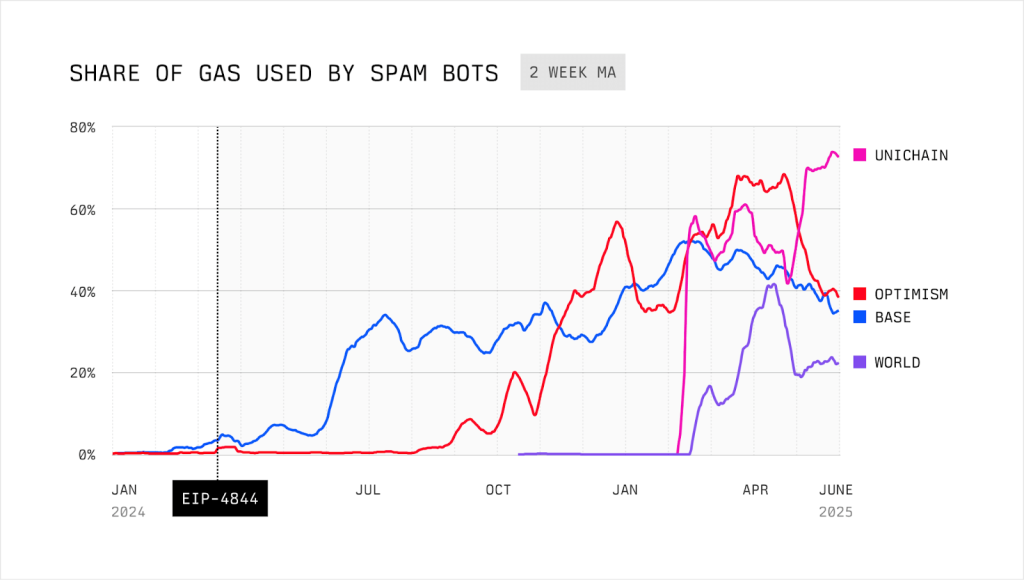Flashbots, a prominent research group specializing in MEV (Maximal Extractable Value), has recently raised a red flag regarding the increasing issue of spam from MEV bots that is rapidly becoming a major obstacle to blockchain scalability.
In a recently published thesis, Flashbots highlighted that MEV has now emerged as the primary limitation to scaling blockchains, citing growing inefficiencies observed across Ethereum rollups and Solana. The group emphasized that ongoing scaling efforts by major blockchains are being hindered by the escalating dominance of MEV-driven activities.
Flashbots Exposes Scaling Illusion on Rollups
As layer-1 and layer-2 networks strive to enhance throughput, Flashbots’ report reveals that wasteful on-chain activities from MEV bots are consuming a significant portion of available capacity. MEV bots on Solana are currently accounting for a staggering 40% of all blockspace, while on Ethereum’s OP-Stack rollups like Base and OP Mainnet, spam bots are responsible for over half of all gas usage despite paying only a fraction of the network fees.
The report pointed out that although Base significantly increased its gas throughput by 11 million gas units per second between November 2024 and February 2025, most of this additional capacity was devoured by bots engaging in repetitive and low-value trades. This resulted in artificially high fees for users and diminished the effectiveness of technical scaling efforts. Flashbots introduced a new metric called “effective gas throughput” to highlight this discrepancy.
Furthermore, the report identified spam as a specific form of wasteful behavior, mainly involving DEX queries that do not lead to actual token transfers. These activities could easily be conducted off-chain, but instead, they congest networks and increase the computational burden on nodes. On Base, bots were found to be responsible for 56% of gas usage and 26% of L1 data availability usage, while only contributing 14% of the fees.
Proposed Solutions to MEV Exploitation
In response to the rising concerns surrounding MEV exploitation, Flashbots has put forward a new framework aimed at addressing these issues. The organization suggests moving away from gas-heavy spam auctions towards explicit MEV auctions, enabling searchers to bid directly for transaction ordering rights. This shift is expected to reduce network congestion and wasted fees while maintaining efficiency for traders and validators.
Flashbots is also advocating for “programmable privacy,” a model that allows bots to view live blockchain state and plan profitable trades without the ability to front-run users or leak sensitive data. The organization is currently testing this concept using Trusted Execution Environments (TEEs) to ensure secure transaction backrunning without the risk of abuse.
The proposal comes at a critical time as concerns over MEV-related abuse continue to grow. According to EigenPhi data, sandwich attacks orchestrated by a small number of entities have affected thousands of users, resulting in nearly $1 billion in weekly trading volume on Ethereum-based DEXs.
In conclusion, while MEV can enhance DeFi efficiency, unchecked practices can lead to higher fees and unfair advantages, ultimately potentially deterring user adoption and undermining trust in decentralized finance. Flashbots’ proposal offers a potential solution to mitigate these issues and foster a more equitable and efficient blockchain ecosystem.

